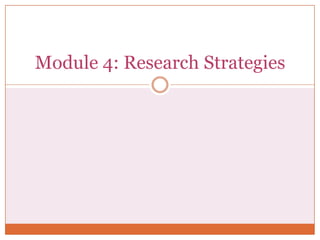
Research Strategies: 4 Key Types
- 1. Module 4: Research Strategies
- 2. Learning Goals Explain the advantages of research over other ways of knowing Understand the ways in which bias can influence research Compare and contrast the advantages, disadvantages and key characteristics of different research strategies in psychology Discuss the ethical guidelines that protect humans and animals in psychological research
- 3. Why is research important? Scientific method- a method of learning about the world through the application of critical thinking and tools such as observation, experimentation and statistical analysis Use to find out things that we have not known or to even back up or change things that we know. Common sense-takes you only so much
- 4. Observation and bias Thinking critically- how are some ways that bias can influence research Observation most common way to collect data confirmation bias- tendency to search for information that confirms a preconception Participant bias-a tendency for research participants to behave in a certain way because they know they are being observed or they believe they know what the researcher wants Nturalistic observation-observinbg and recording behaviors without manipulation or control
- 5. Case Studies Thinking Critically: why do psychologists use case studies Case studies-A research technique in which one person is studied in depth in the hope of revealing universal principles can’t use case study everytime… abuse
- 6. correlation Why is it impossible to conclude cause-and effect relationships from correlational data? Correlational study- A research project strategy that investigates the degree to which 2 variables are related to each other Is not used to solve cause and effect Perfect positive correlation Perfect negative correlation Moderate positive correlation Moderate negative correlation Used for making predictions
- 7. Surveys Thinking critically why should we be cutious when applying data obtained from surveys? Survey method- a research technique that questions a sample of people to collect information about their attitudes or behaviors Population- the entire group of people about whom you would like to know something random sample- a sample that fairly represents a population because each member of the population has an equal chance of being included
- 8. Longitudinal and cross-sectional study Use of many types of tools Longitudinal study- A research technique that follows the same group of individuals over time. Example test before the school year and after Cross sectional studies- a research technique that compares individuals from different age groups at one time Example people who watch mtv random sample
- 9. Experiments Observatin, case studies, correlational studies, surveys, longitudinal studies, and cross-sectional studies are all important and most cases combined with one another Used to establish correlations Experiment-A research method in which the researcher mainpulates and controls certain variables to observe the effect on other variables Experiment only method in which can you can draw conclusions in a cause and effect relationship. Purpose is to control different variables in a study
- 10. Hypothesis and operational definition First step develop hypothesis Hypothesis-a testable prediction about the outcome research Start off with general predictions Variables can be used to measure areas. Operational definition-an explanation of the exact procedures used to make a variable specific and measurable for research purposes get specific with ideas of how to define these areas Should be appropriate for your research
- 11. Independent and dependent variables Independent variable(IV)- The variable that the researcher will actively manipulate and, if the hypothesis is correct, that will cause a change in the dependent variable Presence of headphones Dependent variable-The variable that should show the effect of the independent variable ALWAYS TRY TO DEFINE THESE VARIABLES TO HELP YOU UNDERSTAND THE EXPERIEMENT
- 12. Groups, random assignment and confounding variables To make independent variable vary, researchers set up groups of participants Should have at least 2 groups an experimental group and control group Experimental group- The participants in an experiment who are exposed to the independent variable Control group- the participants are not exposed to the treatment Control group serves as comparisons and are important to the experiment
- 13. Groups cont… Number of size in the experimental and control groups vary and depends what you are trying to prove How do we determine who to put in experiment??Random assignment- A procedure for creating groups that allows the researcher to control for individual differences among research participants Differences that we can’t necessarily control( mental state, health and so on) Confounding variable- in an experiment the variable other that the IV that could produce a change in the dependent variable
- 14. Factors Psychologists must make sure that the participants are not aware of the hypothesis Do not tell them the hypothesis until after the data has been collected Double blind procedure-a research procedure in which both the data collectors and the research participants do not know the expected outcome of the experiment(effective studying) Helps see not only what the experiment wanted to see but also to see other areas which they didn’t expect
- 15. Placebo- an inactive pill that has no known effect Used when doing experiments with drugs Done with the experiment now what…. Statistically significant See the difference between the groups, uniform results and how many participants are in the group Replicate- to repeat the essece of a research study to see whether the results can be liably reproduced
- 16. Ethics Ethics play an important role in society Example-cant replicate abuse so you use case studies Human research and animal research refer to page 69 in book Many rules that will help protect people and animals and keep you out of jail